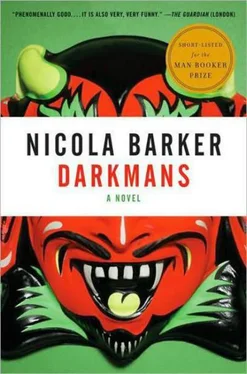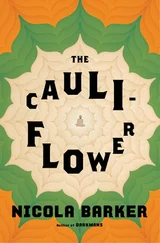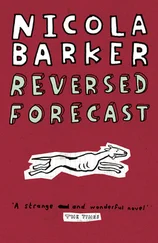‘ Exactly! ’ Harvey slapped his large, clean palm down hard on to the table-top. ‘Podiatrist! That’s Latin, right there!’
Elen tried to dissuade him. ‘It’s actually Ancient Greek. Podiatry is an American term. In Britain we tend to call ourselves chiropodists, but strictly speaking, Cheir means hand and Pod means…’
Harvey flapped a dismissive paw at her. ‘Greeks, Latins, same fuckin’ difference , mate. The point is this: it don’t matter what kind of a doctor you are. You’re a doctor . You’re educated. You’re professional …’
Elen flinched slightly.
‘I mean don’t get me wrong,’ Harvey continued, ‘we Broads have been in the buildin’ trade for years —generations. We’ve been knockin’ things up an’ pullin’ ‘em down again for so long that it’s like a profession to us. Point of fact, my great-great…’ he flapped his hand impatiently, ‘ etcetera grandad once wrote a very famous book about the most healthy way to build a house. This same man was a surgeon, too. A physician, and to royalty , no less. Also wrote what they call a “pamphlet” about astrology…’
‘That’s amazing,’ Elen said.
‘Yeah,’ Harvey agreed.
‘So we ain’t stupid by any means. But when it comes to this whole A Priori issue I’m what you might call an “interested party”. Nobody’ll take me seriously. But you …’
Harvey appraised her, tenderly. ‘You’re just a member of the public. A professional female. An intellectual. So if you just happened to write them a letter…I dunno, sayin’, for example, how you’re educated and speak Ancient Greek, and when you went to the phone book you was disappointed… no, no…shocked to see A Priori in the wrong place…’
Elen allowed this all to sink in for a second. As it sank, Harvey continued to gaze at her, determinedly.
‘Just a short letter,’ he re-emphasised, ‘stating how you’re a doctor.’ Elen carefully cleared her throat. ‘So you really…you actually want me to do that?’
Harvey leaned back, sniffed, inspected his nails. ‘Well it’s up to you, obviously…’
He glanced down at his buddy, at his neat line of phones, then up again, pointedly.
Elen blinked. ‘You actually want me to do that now ?’
Harvey shrugged, as if he couldn’t care less.
Elen slowly stood up and began looking around her — numbly — for a piece of paper. When she’d finally located a scrap, Harvey kindly loaned her his pen. It was a Parker.
Isidore was not German. He was English. But being German seemed to work for him, so he stuck with it, he cultivated it. In fact he’d honed it to such a pitch now that he rarely even thought about it. It just fitted him, somehow, was comfortable, like a well-cut jacket (the maker’s mark — the discreet tag — neatly located on the inside flap, but then gently scratched out–
A thumbnail?
A flattened blade?
— until the embroidery had snagged and become unreadable).
Both of his parents had been teachers. His father, Laurie (second-generation London Irish — a lapsed Catholic, whose ancestors hailed from County Waterford, originally), was a huge, flame-haired, pale-skinned man — sandblasted in freckles — who specialised in the sciences. His mother, Clare (darker, much smaller; her grandparents, on her mother’s side, exiled Jews, from Czechoslovakia), specialised in languages (Ancient Greek, Latin, French and German). They were enthusiastic travellers, and had toured extensively — throughout Europe, the Far East and Australia — during the early years of their marriage.
Laurie had suffered — man and boy — from both asthma and eczema, and had gradually evolved — through trial and error — into a keen proponent of alternative methods of healthcare. His favourite quote was by Father Sebastian Kneipp, founder of The Wellness Movement, who said, ‘Those who do not find some time every day for health must sacrifice a lot of time one day for illness.’
He quoted it often, but always — like Pfarrer Kneipp himself — in a gently accented Bavarian-German (it was just too bad if the person he was quoting at was unfamiliar with this particular idiom).
Teaching could not hold them. In 1976, when Isidore was still quite young, they’d emigrated to Germany, intent upon establishing a Wellness School, or ‘Kurhaus’—aimed principally at attracting English holiday-makers during the summer season; an evangelical establishment, brimming with health, good sense and cheerful discipline.
They spent two years in ‘Kneipptown’ (Bad Worishofen), learning the business of Wellness in all its configurations, then toured for a further six months, finally electing upon Bad Munstereifel — in the Northern Rhine Westphalia region — as the place to settle. It had much to recommend it: was a picturesque medieval spa-town (already steeped in the Wellness Tradition), full of neat, timber-framed houses, surrounded by an infinity of rolling, densely forested hills, clear streams and small mountains.
For ‘Wellness’, location was everything. The Kneipp Kur System was established upon The Five Pillars of Kneipp. These were Hydro (water therapy), Phyto (plant therapy), Kinesi (exercise), Dietetic (less meat, more cereal) and Regulative (early to bed, early to rise).
They bought — and renovated — an oldish (but not ancient) timber mill on the outskirts of town. It was big, but never — to Laurie’s mind — big enough (which structure could be? His ambitions knew no bounds).
Only a small portion of the whole was to be their home. The rest, a labyrinth of tiny ‘cells’ (bed, sink, cupboard) and treatment rooms (pine-panelled, stone-floored, white-tiled).
The entire structure was circumscribed by an endless proliferation of copper piping, which fed into a seeming infinity of deep, ceramic baths, huge showers and wide basins (with gulping-hungry plugholes and giant, brass shower-heads, which hung from the ceilings — bent and top-heavy — like sinister, metal sunflowers).
And then, but of course: the Refectory (the busy clatter of cutlery at those endless lines of rough-hewn wooden tables, punctuated, every so often, by the odd, shrill squeal of the ecclesiastical-style benches as some foolish hot-head tried to stand up too suddenly), the awe-filled hush of the Consultation Room, the efficient, aromatic clink of the Dispensary (with its beautiful, white marble pestle and mortar, its tiny spoons and its delicate tweezers, its old-fashioned, brass scales — which were polished, every week, without fail, by a dutiful Isidore — and the shelves, and shelves, and shelves of fascinating, antique, green-tinted glass bottles, crammed with herbs and salts and tinctures and unguents).
All this space, and yet Isidore had no room of his own. Retreat — at home — was never really an option. His father was everywhere, inhabiting every corner. Isidore was only master of a small, cramped ‘cubby’, a slightly raised niche (or recess), moulded into the thick, old, stone wall of their living-room (by all accounts — his mother would opine proudly — an ‘original feature’), where he’d carefully wedge himself — like a coin in a slot machine — to sleep each evening.
‘Your playroom,’ his father would tell him, chin up, gesticulating grandly, ‘is the pine forest, the sweet meadow and the running stream. The whole world is your kingdom, Isidore. Was ever a child as blessed as you are?’
He knew that he was lucky.
Yet even in the midst of this apparent idyll — this lush, green Utopia — a shadow seemed to hang over the boy. Nothing too dramatic (at least, not to begin with); a slight veil — a film , almost — like an eye with a speck of grease in it, which blinks, then blinks again, and the grease spreads, and it thins, and the obfuscation is so slight, so minor, that it barely even impinges on the consciousness of the sufferer.
Читать дальше
Конец ознакомительного отрывка
Купить книгу












